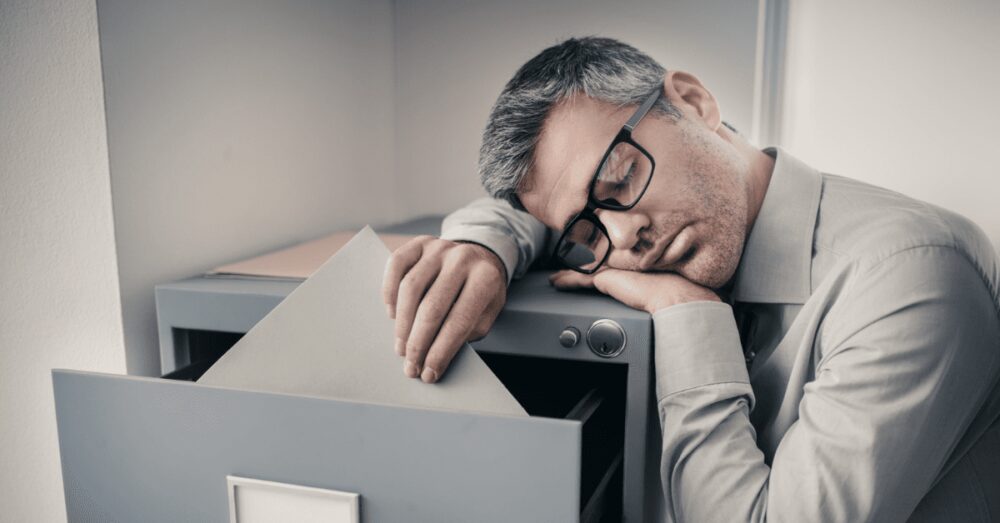If you find yourself falling asleep while at work, you may have a bigger problem than you might think. This can be a sign of something like narcolepsy, or it can be due to excessive screen time. It’s also possible that you simply hate your job or are burnt out from your workload. Regardless, this is a very serious problem.
Boredom

Source: forbes.com
Boredom is a common complaint among workers. It’s a problem that can create stress, disengagement, and even sabotage. And while it can be difficult to identify, there are ways to handle it. Boredom can be one strong reason why you are falling asleep while at work.
The first thing to understand is that boredom at work isn’t always the worst thing that can happen. In fact, it’s usually the result of a larger issue. There are numerous studies that have looked at how boredom can affect employees. One study by the Academy of Management Discoveries magazine found that bored employees are more likely to exhibit creative thinking.
According to a study by the Gallup Organization, nearly 70 percent of Americans say that they experience boredom at work. Interestingly, this translates to an increased turnover rate. Bored employees also take longer to complete tasks, which is not conducive to the company’s bottom line. For managers, it’s important to be able to recognize the signs of boredom and take action.
Excessive Screen Time
Screen time can be measured by the number of estimated hours you spend using a computer, tablet, smartphone, television, or other digital media device. Excessive screen time may have a negative impact on your physical and mental health, so make sure to limit it to the appropriate amount. According to a study, a high screen user can carry twice the risk of experiencing low well-being as a low-screen user. The effect sizes were generally larger for adolescents.
Having too many devices can affect your sleep and your diet. Keeping your devices out of your bedroom will improve your quality of life. In addition, taking breaks can help you avoid the harm of screens. Having too much screen time can affect your eyesight. It has been shown that prolonged exposure to blue light from computers and other electronic devices can lead to poor eye health.
Burnout/ Stress

Source: ghacf.org
When you find yourself falling asleep at work, it may be a sign of bigger problems. Your body has become overworked and drained. It may be time to seek help from a friend or professional. If you’re experiencing burnout, there are steps you can take to get back on track.
The first step is to recognize it. Chronic stress can affect your performance at work and relationships with friends. Getting adequate rest and social support is essential. You can also talk to your supervisor about your concerns.
There are several reasons for chronic stress. One of the most common is an imbalance of your work and personal life. This can lead to a lack of sleep, anxiety, and depression. Some people with a stressful job experience physical symptoms of burnout, including headaches, stomach pain, and exhaustion. In addition, they may feel irritable, listless, and inattentive.
Hating Your Job
If you are a sleeper at work, there are plenty of things you can do to prevent sleeping at work, affecting your life and productivity. A good start would be to enlist the help of a doctor, particularly a primary care physician, and make a plan to avoid any pitfalls.
It’s true that many of us do not enjoy our jobs. They are demanding, stressful, and oftentimes take up all of our waking hours. But if your job isn’t keeping you happy and you aren’t earning enough money to live on, it’s time to consider an exit strategy. Changing jobs is the best way to find a more suitable fit.
There are several reasons why you might fall asleep at work. The most common culprits include lack of sleep, excessive screen time, and stress. In the context of your current job, falling asleep at work is an unacceptable behavior.
Narcolepsy

Source: healthlibrary.askapollo.com
If you have narcolepsy and falling asleep at work is a frequent occurrence, it could be a sign of a more serious condition. Narcolepsy is a sleep disorder that causes excessive daytime sleepiness, periods of drowsiness and a strong urge to sleep. The symptoms of narcolepsy can interfere with your daily life and affect your ability to concentrate, remember things and perform academic or professional activities.
Some of the symptoms of narcolepsy include hypnagogic hallucinations (dreamlike states) when you are about to fall asleep, and hypnopompic hallucinations (hallucinations) when you wake up. These episodes are extremely frightening because you do not fully understand what is happening.
Narcolepsy is also associated with a sleep disorder called Periodic Limb Movement Disorder, which occurs when your leg muscles contract suddenly every 20 to 40 seconds. Often, narcolepsy patients are unaware of the movements, but their bed partners might notice them.
Conclusion
If you find yourself struggling to stay awake at work, it’s important to take a step back and assess your overall health and well-being. There could be bigger underlying issues at play, and it’s always better to err on the side of caution. If you’re concerned that your sleepiness might be indicative of a more serious problem, talk to your doctor. They can help you get to the bottom of what’s causing your fatigue and develop a plan to get you feeling rested and alert again.


















